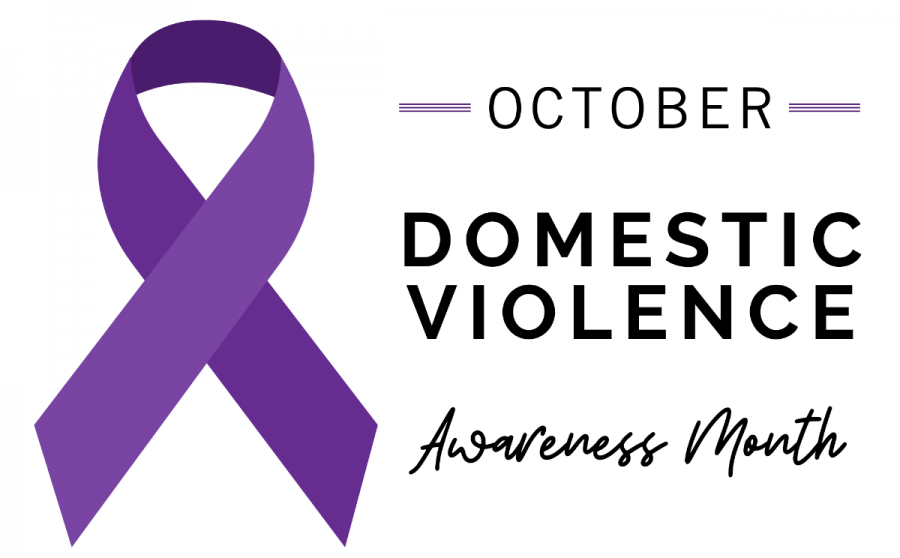Domestic Violence Awareness
Domestic Violence Awareness Month on College Campuses
November 11, 2022
Nancy Skobel, Associate Director of the California campus’s Office of Sexual Misconduct Prevention & Response, has been working throughout the entire month of September in the name of domestic violence awareness. She began the month-long celebration by appearing in every first-year seminar class to educate students on a strategy of prevention called the Green Dot Program. She followed this up by planting red flags with unhealthy behaviors written on them around campus as part of an awareness campaign.
Cassidy Nodaros, a senior criminal justice major, is collaborating with fellow criminal justice major Alyssa Lambert-Alonso, Skobel, and the Office of Sexual Misconduct Prevention & Response to put together the What Were You Wearing? exhibit. Nodaros devised the idea for this project with the hopes that encouraging students to have uncomfortable conversations would start to change the culture and stigmatisms surrounding sexual assault.
“When someone is asked ‘what were you wearing?’ by law enforcement, it contributes to the myth that what you were wearing invited this crime committed against you,” Nodaros said. “It doesn’t! Consent is consent. No means no.”
Nodaros created this exhibit to spread sexual assault awareness and to “eliminate the victim-blaming myth that clothing somehow invites a sexual assault.”
“I think men, women, and children that are sexually assaulted have a story that should be told when they are ready to tell it,” Nodaros said.
The exhibit presented various outfits worn by victims of sexual violence at the time of their assault with a description of “as little or as much of the survivor’s story that they wanted to tell.” Victim ages displayed ranged from as young as two years old.
Skobel also made appearances at meetings for Women United and Gamma Sigma Sigma, where she conducted an exercise that involved members of the organizations designing their perfect partners by choosing character traits. The exercise was created to teach students how to identify red flags early in a relationship.
Skobel and the Office of Sexual Misconduct Prevention & Response work year-round to provide services to victims, and educate students on the components of a prevention and awareness strategy. Prevention, including the Green Dot program, works to “[reduce] the number of crimes that happen on campus.” Awareness, including the Red Flag Campaign, consists of “providing services to anyone impacted by dating violence, domestic violence, sexual assault, (and) stalking” and providing supportive measures – academic, transportation, work, and housing through Title IX. These measures include assistance in obtaining a protection from abuse order, working with faculty to provide reasonable academic accommodations for victims, connecting victims to counseling, assisting with the relocation of a victim, help filing a criminal complaint, and accompaniment to court.
According to the National Coalition Against Domestic Violence, domestic violence is defined as “the willful intimidation, physical assault, battery, sexual assault, and/or other abusive behavior as part of a systematic pattern of power and control perpetrated by one intimate partner against another,” and it includes sexual violence, physical violence, emotional abuse, psychological abuse, threats, and economic abuse.
“If you ask any victim,” Skobel said, “whether the physical or the verbal, which was worse, they’ll always tell you the verbal.”
The NCADV also states that domestic violence occurs most often to women between the ages of 18 and 24 – college-aged girls. Skobel said that the safety and security of everyone on campus can only be achieved by “each of us, every person on this campus, doing their part to keep each other safe.” This means becoming educated on what unhealthy behaviors look like so that red flags can be identified early. It also includes learning to become an active bystander and speaking up or stepping in when spotting someone in a potentially dangerous situation.
Skobel said that when she began her career, “more students were reporting sexual assaults than instances of dating violence.” Skobel has also noticed that the definition of domestic violence has expanded and evolved, and people are becoming more aware of what domestic violence is. Increasingly more people are speaking up and reaching out to get the help they need.
The NCADV states that 1 in 5 women will be sexually assaulted at some point during their time at college. The Domestic Violence Hotline operates 24/7 and can be reached at 1-800-799-SAFE (7233), or online via TheHotline.org.






